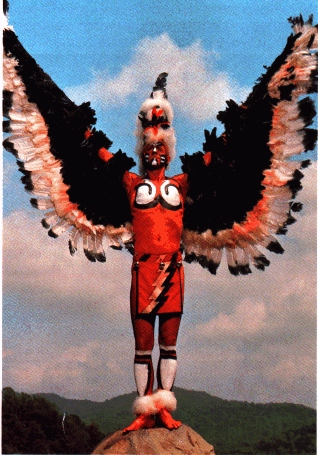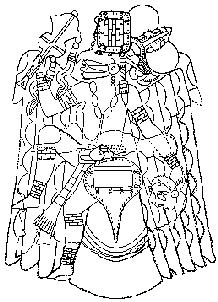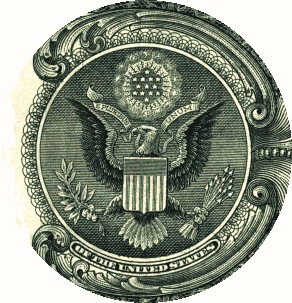Cherokee Indian world-view:
a different way of seeing
by Masa and Joe
Masa: We had a good time the other day exploring a gold mine and
panning for gold. We also felt a little uneasy about something. Why didn't the Indians
collect the gold that was so abundant on their land? Before we attempt to answer this
question, we would like to introduce a few more details of Cherokee history.
Joe: Until 1828, European-Americans and Cherokee-Americans
cooperated at many levels. Because of this cooperation, the American government guaranteed
protection of the Cherokee nation. In their country, the Cherokees developed a written
symbols for their language and distributed a newspaper. Therefore, in the eyes of the
European-Americans, the Cherokee civilization was quite developed.
This relationship changed in 1828 European-Americans discovered gold on
Cherokee land. Those who discovered the gold wanted to make it their own. After the
European-Americans discovered gold the American government protection of Cherokee lands
ended. Because of the new demands of the gold miners, in the winter of 1938 over 10,000
Cherokees were forced from their land of the Trail of Tears. About 2000 Cherokees chose to
hide in the high mountains. To better understand the Cherokee problem of this age we
checked on two aspects of Cherokee culture including a trip to the country founded by the
Indians who hid in the mountains.
- Masa: Joe's great-grandmother was a Cherokee Indian. That's why Joe has
always had an interest in Cherokee Indians since he was a boy. The part of Cherokee
culture that he has taken the most interest in is the Cherokee sauna. In the old days,
every Cherokee house had a sauna. There were many uses for the sauna, but the most
interesting was the one Joe introduced to us. Every month on the new moon, to be born
again like the moon, the men did a sauna in a special sweat lodge built next to the river.
We tried it on the full moon.

- To build the sauna, you need about 12 flexible saplings to form a
dome-type structure. We covered the structure with dome with five blankets. After that, we
gathered a lot of branches for a fire and put about fifty stones in the middle of the
fire. After the rocks got red-hot, you can bring them into the sauna and put water in them
to heat the sauna.
- While Joe was heating the rocks, Daniel and I built a rock stairway on
the river-bank. By the time we finished, it was almost dark and the stars were coming out.
We climbed out of the river and entered the sauna. It was pitch black inside.
- A few at a time, Joe placed in the middle of the sauna, the rocks he had
heated in the fire. The sauna got hotter and hotter. After we were in the sauna for about
20 minutes, we climbed out of the sauna and down the stairway we built to the river. We
dove in the river seven times.
- We felt great! As we sat on our rock steps we watched fireflies on the
river bank and stars in the sky. We felt completely refreshed and we were not cold at all.
We then entered the sauna a second time.
- The second time in the sauna was even better than the first. Our sweat
flowed like rivers again and we made up stories as we put the water on the rocks. For
example, "the sound of the water hissing on the rocks is like the sound of stars
going out." Daniel said, "the rhythm of the frogs outside was like the rhythm of
the blood in our hearts.
- After we dove in the river again, the full moon was beginning to rise
and shine in the river. It was very beautiful and we felt like we were born again!
- Joe: The next morning, we woke up very early and went to
Cherokee, North Carolina to visit the Cherokees whose great-grandparents hid in the
mountains rather than go to Oklahoma on the Trail of Tears. We visited a replica village
learned about the Cherokee way of life a hundred years ago. We learned many factors that
may explain why the Cherokees did not get "gold fever" like the
European-Americans.
- Cherokee women held the deeds to land. Men could not own land. Because
men had to marry outside of their respective clans, it was unlikely that they would gain
much control of the land. After gold was discovered, and European-Americans could not
purchase Cherokee land, or acquire it through marriage, conflicts increased.
- Cherokees had a different relationship with nature than the
European-Americans. The Cherokees viewed nature as an integral part of human society. In
the third part of the Cherokee eagle dance, the dancer thanks the bird for use of its
feathers. (The Cherokee's revered the eagle because of its superior strength and in part
because of its constant effort to renew itself by pulling its own feathers and scraping
its own beak to stimulate new growth.) When we asked our Cherokee guide why he thought the
Cherokees catch gold fever and mine and sell the gold on their land, he told us a story
that his grandmother told him, that during a certain time of the year, the streams would
"catch fire" with the color of gold. She said that there was gold, but not
enough to make money. The guide added that the Cherokee had no reason to mine the gold.
"We believed that if you took something from the land, you had to give something
back." Perhaps, the women who controlled the land believed that mining the gold for
money was not a valid use of the land.
- We can only speculate as to the reasoning of the female Cherokee
land-holders, but we can be certain that their way of seeing the land and peoples
relationship to it was different from the predominant European-American view of the era.
The Cherokee sauna for self-renewal with the cycles of the moon was just another example
of a very different Cherokee view of the world. This different view of the world did not
enable the Cherokee to protect their land from the European-Americans during the Gold Rush
era, but in the long run, such a view of man and nature as interdependent parts may prove
to be more valuable than gold.

A Cherokee Indian Eagle Dancer
performing in the "Unto These Hills" drama in Cherokee, North Carolina


On the left is the Etowah Indian Eagle Dancer
On the right is the more familiar eagle on the American dollar bill.

Adventurers' Menu



